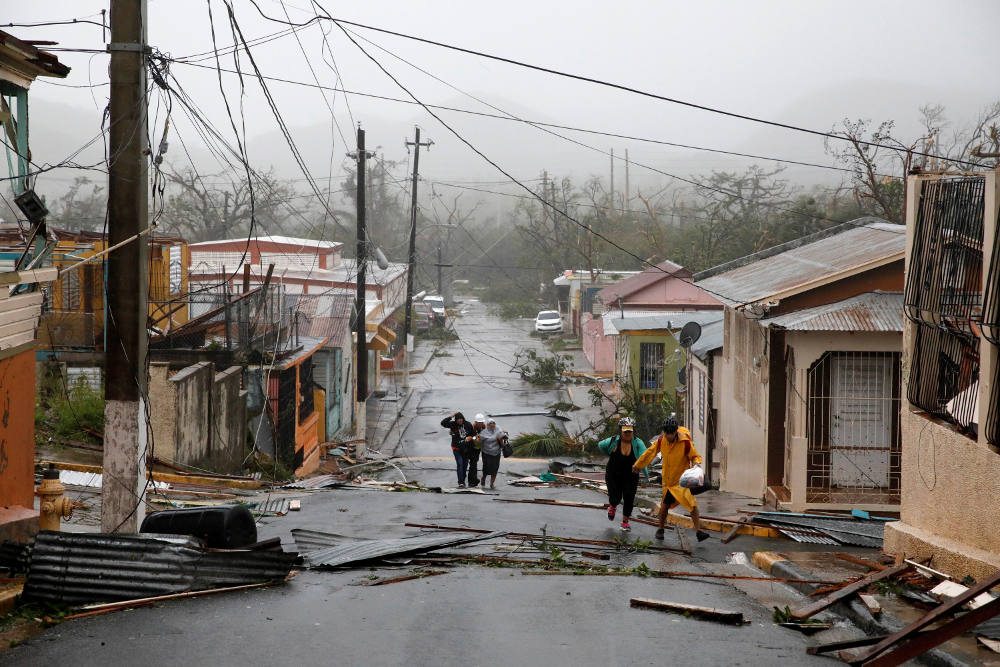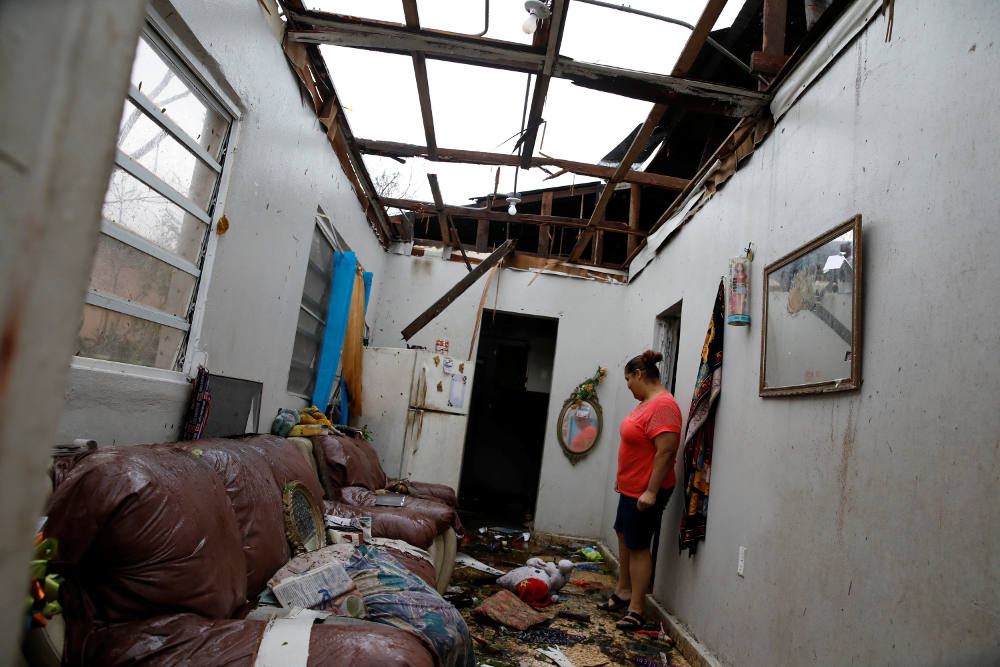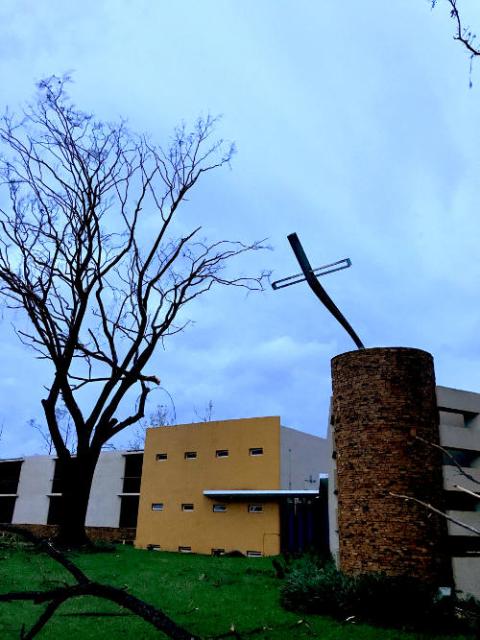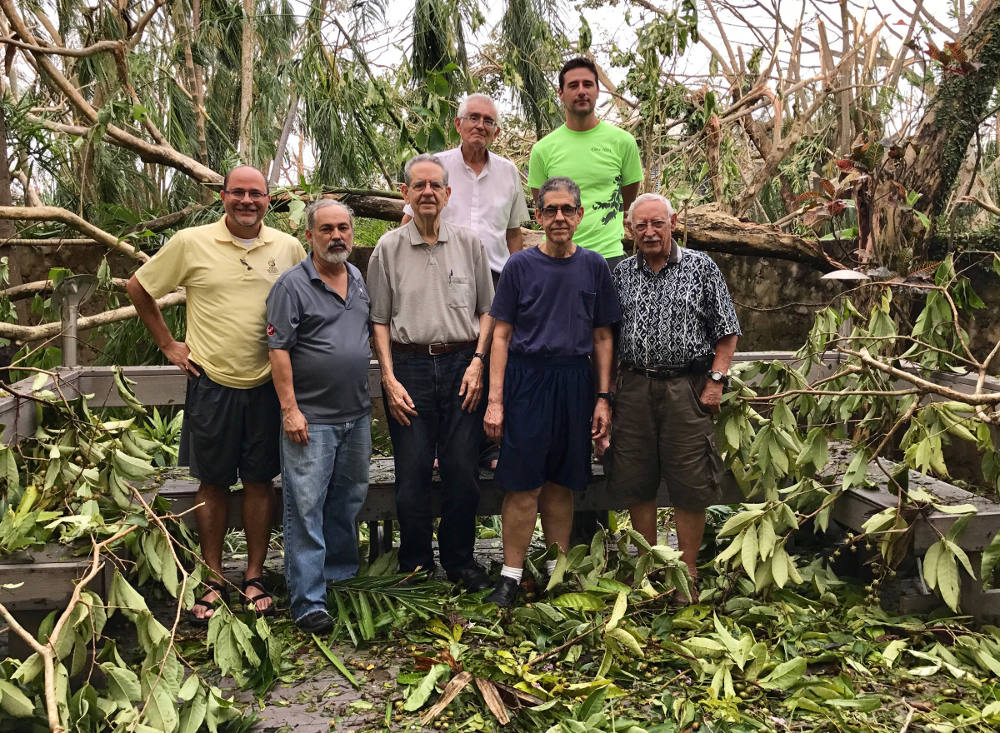
Rescue workers help people Sept. 20 in Guayama, Puerto Rico, after the area was hit by Hurricane Maria. After battering the Virgin Islands, the hurricane made landfall in Puerto Rico, bringing "catastrophic" 155 mph winds and dangerous storm surges. (CNS photo/Carlos Garcia Rawlins, Reuters)
Authorities say it may take months for electricity to fully return to Puerto Rico after Hurricane Maria pummeled the island and its infrastructure as it made landfall Sept. 20.
When the hurricane hit the island with winds of up to 155 miles per hour, it tore out cables, roofs from homes and buildings, uprooted palm trees and even bent a cross anchored to a cement post at the entrance of a Jesuit school.
It has been difficult to communicate with those on the island, said Capuchin Franciscan Fr. Urbano Vasquez, of the Shrine of the Sacred Heart in Washington, who studied in Puerto Rico and has vast ties to the island. He told Catholic News Service in the days after the storm he had been trying to communicate, to no avail, with a community of Poor Clares in Cidra, Puerto Rico, and others he knows on the island, but phone service is hit or miss.
Vasquez, however, was able to make contact with a group of seven Capuchin Franciscan friars after the hurricane passed. They took refuge from the storm in Trujillo Alto, about 10 minutes from Old San Juan.
"They were scared because it was the first time they've been through something like that," said Vasquez. "They spent the time praying or near the Eucharist" as winds tore through part of the roof near a chapel in the building at Centro Capuchino. Some later sent him videos of the winds whistling through the streets, images taken from a cracked window in an arched entrance door.
The entrance door to the friary caved in, he said, leaving no path for the friars to make their way to the main street. But even if they could get out to the street, authorities have put a curfew in place, which has been extended indefinitely, afraid citizens could come in contact with fallen cables and other objects that could pose danger on the ground.
The friars told him of the devastation they could see from inside, he said, including fallen palm trees and blocked roads. A parishioner sent him photos of debris, such as torn and battered traffic lights left behind by Maria's wrath.

A woman looks at the damage in a neighbor's house Sept. 21 in Salinas, Puerto Rico, after the area was hit by Hurricane Maria. (CNS photo/Carlos Garcia Rawlins, Reuters)
Capuchin Franciscan Fr. Carlos Reyes, in a Sept. 21 phone interview with Catholic News Service, said he didn't sleep through the harrowing night he spent listening to Hurricane Maria barrel through San Juan.
"I spent the night praying," he said, and listening to the radio was the only way to hear what was happening in Puerto Rico and the world. He heard about the earthquake in Mexico and in the middle of his own experience with nature's wrath, he prayed for the earthquake's victims.
Water crept in at one point and the friars were doing their best to keep it out of the residence. The only way to live through such an experience is with faith and thinking about safety, he said. Authorities tried to drive the urgent message that Hurricane Maria was no joke and many listened, he said.
"The message was to save life, not the material," he said. "You can reconstruct structures, but not life."
Reyes, originally from El Salvador, said he has lived through strong earthquakes and their damage sometimes affects a centralized area, but Hurricane Maria tore through an entire island.
As of Sept. 26, at least 16 people were killed in Puerto Rico, and 27 deaths have been reported on the island nation of Dominica. Two others were killed in the French territory of Guadeloupe and one on the U.S. Virgin Islands.
Advertisement
Cardinal Daniel DiNardo of Galveston-Houston, president of the U.S. Conference of Catholic Bishops, urged Catholics to respond with prayer and other help "in this time of great need for our brothers and sisters in harm's way -- many of whom have been hit repeatedly by the successive hurricanes."
In a Sept. 22 statement, he noted the catastrophic effects of Hurricane Maria were visited on Puerto Rico and elsewhere in the Caribbean "just as we begin to assess the material and emotional damage of hurricanes Harvey and Irma."
DiNardo said: "Casting aside any temptation to despair, and full of hope in the loving providence of God, we pray that our Father may receive unto his loving presence those who have lost their lives, may he comfort the grieving, and may he fortify the courage and resilience of those whose lives have been uprooted by these disasters. May he extend the might of his right hand and bid the sea be 'quiet' and 'still' (Mark 4:39)."
Nearly a week after the hurricane hit, much of Puerto Rico remained without communication and little information had been gathered about conditions. Restoring power to the island could take months, Puerto Rico Gov. Ricardo Rossello told news outlets. Speaking to CNN Sept. 25, Rossello warned of a “massive exodus to the United States” if the island cannot recover.
“We need to prevent a humanitarian crisis occurring in America. Puerto Rico is part of the United States. We need to take swift action,” he told the cable news outlet.

Wind from Hurricane Maria bent this iron cross Sept. 20 on top of a tower at the entrance of the Jesuit Colegio San Ignacio de Loyola in San Juan, Puerto Rico. (CNS photo/courtesy Jesuit Father Flavio Bravo)
Nearly a week after the hurricane hit, much of Puerto Rico remained without communication and little information had been gathered about conditions. Restoring power to the island could take months, Puerto Rico Gov. Ricardo Rossello told news outlets. Speaking to CNN Sept. 25, Rossello warned of a “massive exodus to the United States” if the island cannot recover.
“We need to prevent a humanitarian crisis occurring in America. Puerto Rico is part of the United States. We need to take swift action,” he told the cable news outlet.
The Society of Jesus in Puerto Rico posted on a website a message and a photo of a cross bent by the hurricane's wind, but which is still anchored to a tower at Colegio San Ignacio de Loyola in San Juan, a Jesuit, college-preparatory school that the order operates on the island's capital city.
"With gratitude, we have learned that the Jesuits, faculty and staff are safe," said the message from Fr. Flavio Bravo, Jesuit superior of his order's Puerto Rico community. "Communication from the island remains limited, so we await news on our school families and members of our parish."
It took a couple of days for the Jesuit superior to venture out and survey the devastation of Hurricane Maria, with its torrential rain and winds of 155 miles per hour, inflicted for hours on the island of Puerto Rico.
"We were trapped," because of debris, said Bravo, recounting the initial aftermath of the hurricane on the island. When he finally managed to get outside, the scene was nothing short of "apocalyptic," he said during a Sept. 22 telephone interview with Catholic News Service.

Members of the Society of Jesus in San Juan, Puerto Rico, are pictured near debris left by Hurricane Maria after the Sept. 20 storm. (CNS photo/courtesy Jesuit Father Flavio Bravo)
In what was once a lush forest, the palm trees that are still standing look more like telephone poles because they have no leaves on them. Before Maria, it was hard to see anything past the dense tropical foliage, and now "you can see all along." Seeing the fallen trees, "it is brutal," Bravo said.
But what was most shocking, said Bravo, was the sight of the cross at the entrance of Colegio San Ignacio de Loyola, the secondary school the Jesuits operate on the island: The 6-foot-5-inch cross was bent into a 45-degree angle by the hurricane's forceful winds and now looks almost like a sword planted on the cement post.
"It was a sight that touched me. But that cross invites me to think: What have I done for Christ? What am I doing for Christ? What ought I do for Christ?" Bravo said, citing part of the Jesuits' Spiritual Exercises. "It was a message of destruction but also of reconstruction."
Puerto Rico, as well as other places affected by September's back-to-back hurricanes, first Irma and now Maria, has a long way to go before life returns to normal.
Bravo said the aftermath has left a pile of emotions and thoughts almost as high as the debris: sadness, desperation from lack of communication, the poor who already were suffering will now suffer more, wanting to help but not knowing where to begin. It feels daunting, he said.
Those who have been able to free themselves from damaged buildings and homes are out looking for neighbors, family, making sure everyone is OK.
"There isn't a sense of panic, but (rather) sadness. ... You don't know how to console, or be consoled" because there's so much destruction all around, he said.
Puerto Rico, which already was experiencing economic problems because of huge debt due to mismanagement, had an infrastructure with massive problems before the hurricanes arrived. The economy already was weak, people were leaving the island behind and with it, family, because of the financial problems. And now those who had little, have nothing, Bravo said.
"It's an avalanche of disasters, one disaster after another disaster," he said.
One of Bravo's tasks is to repair the damage done to the Jesuit school, which educates more than 600 in San Juan, and which already had suffered damage from Hurricane Irma. Electricity will not return for a long time, he said, maybe four to six months. There is a lot of broken glass, damages to buildings, and debris to clear.
And yet, he said, the feeling he hangs onto is of gratitude to God, gratitude to those who are thinking about those who are suffering on the island and other places, gratitude for those who have been moved with compassion, gratitude for those who have helped and want to help, and gratitude for those "who have not allowed us to feel the emptiness," he said.
Even in the midst of tragedy, "we are seeking the greater glory of God," said Bravo. The Society of Jesus in Puerto Rico wants to offer its thanks for the help and support it will take to raise, in the middle of an aftermath, a path of hope to face the future ahead.
On the website jesuitscentralsouthern.org, Bravo posted a link for donations to help with recovery efforts, but much like the Capuchins, it's too early to take in the enormity of damages.
The Capuchin friar Reyes said the damage to Puerto Rico isn't just material but also psychological for those who lived through the experience of Hurricane Maria and he worries for the most vulnerable in the population.
"This leaves behind a lot of damage," he told CNS. "But we hope for goodwill ... the worries and necessities are great ... but we can learn a lot from these experiences, that we have to find the good among the bad. In the middle of all of this, faith strengthens us."







